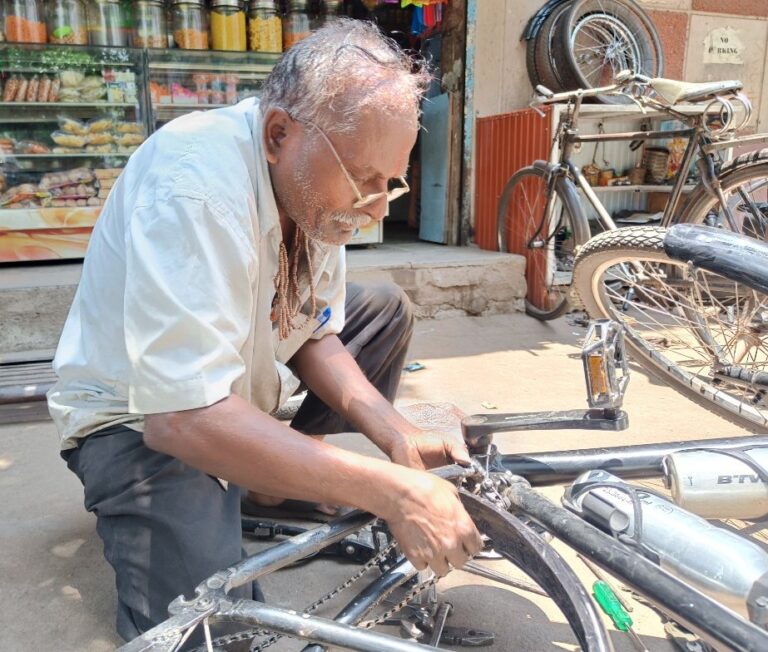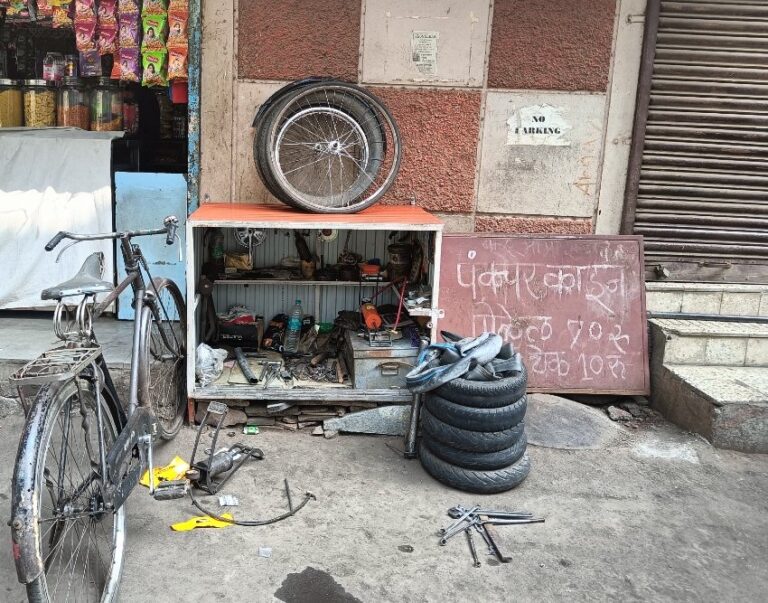How is the life of a roadside cycle repair shop owner in India?
Cycle repair stores by the street side are almost non-existent today. Only the ones that have been set up since a long time ago continue to operate. These shops are turning obsolete as larger businesses are taking over the cycling industry in India. Despite this, there are people from previous generations who continue to run these stores in cities.
On my all-India cycle tour, I had the pleasure of meeting Mr Balasodinkar More, who has been operating a small cycle store in Kolhapur city for the past 30+ years. No amount of searching to get my cycle stand fixed for one entire month in major shops across cities helped me have the problem rectified.
I approached this old man close to 60 years of age sitting by the roadside with the wheel in his hand with great reluctance. I had absolutely no hope that he would even look at the problem. But to my surprise, he not only took a look but decided to put his hand into it. He took an hour time to fix the issue. He sweated so much that his spectacles were filled with it. That didn’t deviate his focus one little bit from the problem. All the while, I patiently waited without hinting to him that he may not be able to do it. He eventually rectified the problem and requested only 100 rupees.
His focus on the problem impressed me immensely. His work which was done with great skill also pleased me equally. At that very moment, I wanted to know what could have brought him to such a place in his life. A shop that was so small that nobody would even notice it if they didn’t know it already existed. I told him I would be back, had my lunch, came back and spoke with him. From my interaction with him, I got to understand him in bits and pieces but received one very important message.
So How is the life of a roadside cycle repair shop owner?
Table of Contents
ToggleLife of a roadside cycle repair shop owner
Mr Balasodinkar told me that he was born to a poor family with 3 other brothers and 1 sister. His parents were workers in farmlands and all his siblings as well do odd jobs to earn a living. Being the youngest of the lot, he continues to live in the mud house that his dad had built long ago.
Balasodinkar Sir told me that he spent 20 years of his life doing nothing. He would roam around free, go about meeting his friends, swim in the lake and play all day. When he turned 21, he went to a cycle workshop where he picked up some skills. As he enjoyed repairing cycles, he stuck with the job. Initially, he worked for another shop until he learned about cycles in and out, and finally opened a shop of his own in 1996 which he continues to run to date.
Sir told me that he earns close to 400 to 500 rupees in a day which is good enough to run his family. He has no savings or has ever thought of investing in a bigger business. He has two children. A son of age 22 and a daughter of 25 one completed with B.com and the other studying the same. He said he is contented and happy in his life. Due to a lack of education, he said he finds it hard to guide his children. He has helped them get educated and it is now left to them to do what they have to with it.
Mr Balasodinkar had simplicity written all over him. He didn’t seem to be bothered about anything much. He had very little expectation of life. He said that how ‘big’ one’s dream is based on how one perceives ‘big’ to be. Education has full control over this perception. It seemed like Sir had the realization of his life. To understand him further, I asked him a couple of questions on the personal front.
Justification
On being asked why he turned out to be a cycle repair shop owner and not anything else, he told that he had to make money somehow for a living. He just took up the first job possible. This reminded me of another person who runs an NGO who said he took up something that came his way as he had to start somewhere (read this article). Sir told that as he enjoyed working with cycles and fixing them he just stuck with it.
Validation
On being asked why did he do whatever he did. He told it was firstly for himself that he had to somehow take care of himself more than anything. Next, it was his family. It is his duty to take care of them.
Complaints
The biggest complaint he had in life was that it didn’t occur to him that he could have gotten educated sir said. On asking what he would have done had he gotten educated, he told that he wouldn’t have done this job. He would have earned well and lived a better life. He said he hopes his children can make a better living.
Materialism
On being asked what he would do if he received lumpsum money, he told he will invest in kids education. If he got more than that, he would build a house.
He concluded by saying that legends such as B R Ambedkar are made because they got educated. Education is the only God. It was surprising how a daily wage worker had such strong opinions on education. In fact, this wasn’t the first case I noticed the same (read this article).
I am a 31 year young PhD graduate who has decided to travel the length and breadth of India on my cycle, to document the journey of meeting a vast array of people. In my journey, I intend to understand the characteristic features of the people of this nation and categorize them based on their demographics, age, profession, gender, traditions, and cultural differences.


Thk u Asutosh for recognizing Mr Balasodinkar for his work.
Thk u Asutosh for recognizing Mr Balasodinkar for his work.
Dr Ashutosh sir, thank you for highlighting of micro cycle repair workshop owner life
Mr. More’s take on perception of ‘big’ really appealed to me. It does make one think about ambitions and their pursuit and the meaning behind it. Glad you wrote about this humble being